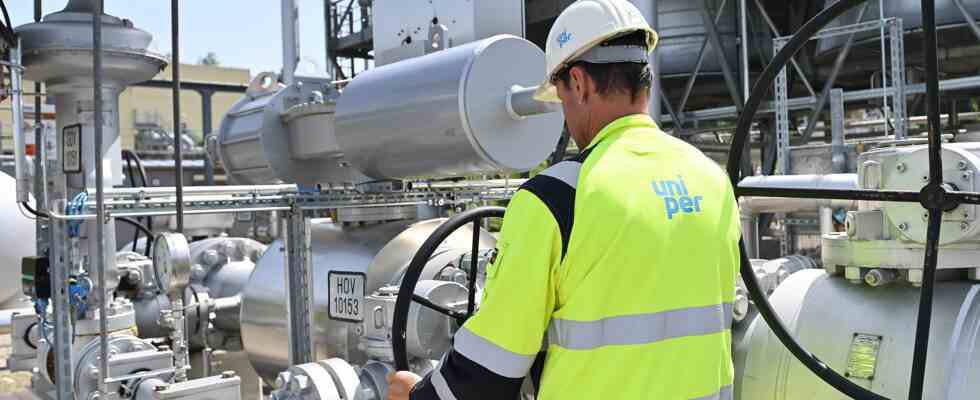Status: 04.07.2022 9:18 p.m
According to reports, the responsible ministries have agreed on a change in the law in order to be able to save ailing energy companies like Uniper with tax money. The federal government should be able to invest in companies.
In the gas crisis, the federal government wants to create a “protective shield” for ailing energy companies. Legal changes are intended to create the conditions for the federal government to be able to invest in companies such as Uniper.
The Ministries of Economics, Finance and the Federal Chancellery agreed in principle on a draft, according to government circles. The “Spiegel” reported about it first.
Financial aid and takeover of company shares
This draft amendment to the Energy Security Act is also available to the dpa news agency. This regulates financial aid through to the acquisition of company shares in order to be able to avert the bankruptcy of a gas supplier.
The aim is to expand the federal government’s scope for action, according to coalition circles. The traffic light factions are expected to agree tomorrow. The reformed law is to be passed in an expedited procedure in the Bundestag and Bundesrat as early as Friday.
Avoid drastic price jumps
In addition, drastic price jumps for gas customers could then be prevented with probably billions of euros in stabilization measures for affected companies.
The draft also says: In order to ensure security of supply, stabilization measures for “critical infrastructure companies” should be facilitated by the federal government – this is aimed at energy suppliers. Such measures would only be considered if they were requested by the company concerned.
Uniper calls for help
Russia has severely curtailed supplies through the Nord Stream 1 Baltic Sea pipeline. As a result, Germany’s largest importer of Russian natural gas, Uniper, encountered turbulence and called for state aid. As Uniper has announced, a number of instruments are possible for this – such as guarantees and security payments through to participations in the form of equity. That means the state would get involved with Uniper.
The federal government had confirmed that it would talk to Uniper about stabilization measures. According to a spokeswoman, the Ministry of Economics is working on solutions “under high pressure”. A spokeswoman for Economics Minister Robert Habeck (Greens) said the aim was to prepare for a continued tense situation on the energy markets and to fill the toolbox. The energy markets must remain functional.
The spokeswoman pointed out that Uniper had not yet drawn an existing credit line of two billion euros from the state bank KfW.
Uniper plays a central role
As a major gas importer, Uniper plays a central role in Germany’s energy supply and supplies many municipal utilities. However, Uniper is currently unable to pass on additional costs for gas intake to customers – the company had announced that this would result in significant financial burdens. The state could now give Uniper financial support. This was referred to in coalition circles as the first option. The other possibility would be that gas customers would pay price increases – but this could lead to drastic price increases for consumers.
The existing Energy Security Act allows utility companies a “right to adjust prices”. To do this, the Federal Network Agency must have formally determined a “considerable reduction in the total amount of gas imported into Germany”, which has not yet happened. If the mechanism is activated, suppliers could pass on their current additional costs to their customers within a short period of time and lead to large price jumps.
When Russian gas disappears altogether
Habeck had warned of a possible “price explosion” at some public utilities. In order to distribute price jumps more fairly among consumers, the federal government is therefore working on a pay-as-you-go system. This means that loads could be distributed more evenly among all consumers, as it was said.
Energy companies’ problems could be exacerbated as Nord Stream 1’s annual maintenance work, which typically lasts 10 days, begins on July 11. Then no gas flows through the pipeline. The big concern is that Russia won’t turn on the gas tap again after the maintenance. Habeck and the Federal Network Agency had warned of such a total failure of Russian gas supplies by Nord Stream. The Federal Network Agency wrote in its management report that the gas supply in Germany is currently stable. The security of supply in Germany is still guaranteed.
Uniper rescue based on the Lufthansa model
No decision had yet been made on the exact way in which Uniper would be supported, the government and coalition circles said. One wants to legally decide on a whole set of instruments. Further options are to be introduced along the lines of the Lufthansa rescue that has already been implemented. In government circles it was said that direct participation by the state in the suppliers was not the top priority when it came to aid. However, in an emergency, it should be done quickly.

